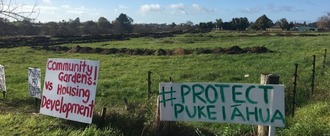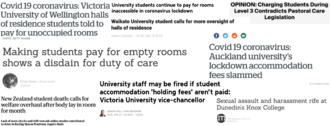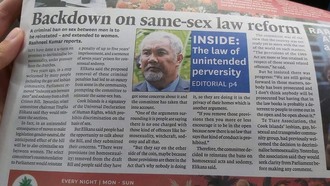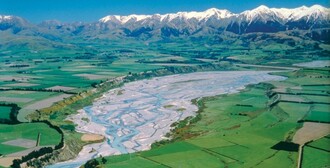-
#protectpukeiāhuaUPDATE: Our petition was formally read and tabled in Parliament on 28th July 2020. Recently, the Māori Affairs Committee invited us to make a written submission on our petition by early February. We have several projects kicking off soon, including a neighbourhood parakore initiative, school and community tours, and master planning for Pukeiāhua. *** Pukeiāhua Pā in Ngāruawāhia is a historic Māori settlement with great cultural, archaeological and educational value to hapū and the local community. Over three hundred years ago, during a feast held at Pukeiāhua Pā, Ngāti Tamainupō chief Ngaere spoke these words: "Wāhia ngā rua - Break open the food pits." This is the story of how Ngāruawāhia was named, a narrative carried by each and every resident and business who call this place 'home'. According to hapū research, over 140 borrow pits or 'rua' were part of the extensive gardens making up Pukeiāhua Pā. Sadly, most of these 'rua' have been destroyed due to development, and only seven remain today. These 'rua' are located on the proposed site for a new subdivision. An Archaeological Authority for the proposed subdivision was approved on 25th March 2020, a day before lockdown. Due to an "administrative" error, Ngāti Tamainupō were not notified properly as mana whenua, nor provided with an opportunity to appeal the Authority. Excavation began on-site on 6th May 2020. The next day, concerned hapū and community members turned up in protest to stop further digging. The developer has agreed to stop all works onsite for now, however we need local and central government to come to the table with a solution that will protect this whenua for the whole community. Instead of high-cost housing, we envisage a greenspace that sustains the narrative of Ngāruawāhia as a cultural, heritage and ecotourism location; a place for community gardens and edible forests; and a space for whānau and tamariki to learn, relax and play together. We believe this is a dream worth fighting for, a dream worth uniting for. Sign the petition to ask the Government and Waikato District Council to protect this whenua for good and return it to mana whenua and the community as a reserve. https://www.youtube.com/watch?v=9mrEmuxSUxo&feature=emb_logo4,572 of 5,000 SignaturesCreated by Kimai Huirama
-
5-Point Grade Bump for VUW StudentsThe impacts of COVID-19 on student health, wellbeing and academic success have been wide and varied. Many of us have lost our jobs, had our lives drastically changed, or had our mental health severely impacted as a result of greater financial uncertainty and academic pressure. We have been expected to work and thrive in conditions that are not conducive to academic success. We believe for the sake of student wellbeing, equity, and compassion, the University needs to listen to the voice of the student body and implement these changes for Trimester 1. We ask the University to consider the impact on equity between Victoria students and those of other Universities. A lack of parity between ourselves and Universities such as Otago and Auckland will impact our graduates who are seeking employment in a post-COVID world. In addition, graduates seeking to pursue further education at another University will also struggle, and their chances of receiving financial aid will suffer. VUWSA believes that a grade bump would ensure that VUW students are on equal footing with other universities who have adopted this measure. If this grade increase, alongside other equity measures – such as reduction of course workload, and 2-week extensions on assignments – are comprehensively implemented, VUW students can be assured that their academic success, as well as their health and wellbeing, are at the forefront of the university’s mind. VUWSA, alongside other student representatives, have been advocating through our internal avenues for these measures to be put in place. In many of these meetings we have been part of a small minority of students, often being ignored or shut down regarding this issue. The recent uproar of student voices around this issue have demonstrated the need for greater academic support and communication for those studying at Victoria University of Wellington. For the sake of our wellbeing, equity, and compassion, we call on the University to listen to, and act upon, the concerns of their student body. For more information check out VUWSA’s socials https://facebook/vuwsa or email [email protected].7,355 of 8,000 SignaturesCreated by VUWSA Campaigns
-
Stop the sale of Vailoa, Palauli lands and return to VailoaOle fa'afitauli, o Eleele ma le Fa'asinomaga o Vailoa Palauli, lea ua fa'asalalau i luga o le maketi i Samoa ma atunu'u i fafo, mo le fa'atauina e le au aiga o Nelesoni. I le mae’a ai o faamasinoga, e malolo lava le Afioaga ia Nelesoni. Na o tupe alu, ae le maua se faamama avega. Ua tupu le nu'u ma le Itumalo, ua leai ni fanua i tuamaota e tua iai le mamalu o le afioaga mo le ola atinae ma le tausiga o aiga, tautuaina o Ekalesia ma le nuu, Itumalo faapea le Malo. O isi foi pitonuu ua faoa ele sami ona eleele talu ai ona o aafiaga I suiga o le tau. Ua feomai solo ona ua le lava eleele, ua tupu le Afioaga. O le a fa'atamaia mataaga(historical sites) o lo’o i totonu o nei fanua. E o fa’atasi le eleele ma ona tagata. E le mafai ona ta vavae eseina. O nei eleele o le faasinomaga o le Afioaga. O lo’o fuafua e tuuina atu i le Malo nei mataaga, ise faiga fa’a paaga. Ina ia fa’atumauina pea lona matagofie ma lona fa'alauiloaina i atunuu i fafo, aemaise o ni suesuega ia malamalama Samoa I lona tala faasolopito, mo tupulaga I le lumanai. Ae faamalumalu le pulega a Alii ma Faipule, o Vailoa Palauli. O loo ua maea ona iai atina’e, na fai paaga ai le Itumalo ma le Malo, e ala lea i le suavai taumafa, o lo'o fa'asopolia uma ai tagata lautele. E amata mai Palauli se ia paia Pu'apu'a. O le popolega mo le lumana’i, o le a afaina nei vai taumafa. E le iloaina po’o ai lea o le a agai atu e nofoia lenei lauelele, ae poo a foi ni a latou fuafuaga o le a fai, ina ia toe maua mai latou tupe na fa’aalu i le fa’atauina o nei eleele. O lona uiga, o le a afaina nei atina’e, ma ole a mafatia tagata nu’u, o lo’o fa’alagolago i nei suavai, i le galala i le fia feinu. O fanua nei ua fuafua Nelesoni e faatau atu, o lo’o lumafale I fanua o lo’o galueaina e lenei Afioaga. O le a fa’afaigata ona toe sopolia fanua galue. O le a tele se aafiaga o mafaufau ma lagona. E matua leai se filemu e maua ai. Aua e le mafai ese tasi, ona taofia le loto tiga o tagata nu'u, ona o le faoa o lo latou fa’asinomaga. O lea ua iai le tulafono o faiga Palota 2020, i le fa’ataatitia ina o tuaoi palota. Ma ua mautinoa, le agavaa o tagata mai I ma o, e palota e filifilia se sui o Palauli. O se tulaga matautia lea. Aua, o le a le amanaia se leo o Alii ma Faipule o Vailoa, Palauli pe a taunuu ona faatauina nei eleele. Aemaise ai, alu aso ae sau aso, i se isi augatupulaga, ae faapea mai se tasi o nei tagata e lava le seleni, o le a fia alu i le sui tauva o lenei Itumalo. Aua e le talanoa nisi ma mea tutupu i le lumanai. E pei ona tatou i ai i lenei taimi, na amata ole foa’i ae o lea ua oo mai i le taimi nei ua fai mai o le fa’atau. E talosagaina ma le agaga maualalo, la outou lagolago I le taofia ina o lenei faatauga. Ma ia toe faafoi mai Eleele ma Fanua o Vailoa, Palauli. E auala lea, I le “like” o lenei faasalalauga. Faafetai. Faafetai tele mo latou lagolago. Faamanuia le Atua. https://www.rnz.co.nz/international/pacific-news/417299/ancient-site-in-samoa-up-for-sale https://www.youtube.com/watch?v=G3qbe0JrVcg ALII MA FAIPULE / TAMA FANAU - O VAILOA, PALAULI.2,156 of 3,000 SignaturesCreated by Alii ma Faipule Vailoa Palauli
-
Launch an independent inquiry into residential student accommodation1) Firstly, the legislation that governs residential student accommodation is insufficient, confusing, and unclear. Residential student accommodation is not covered by the Residential Tenancies Act (RTA), meaning that in the case of disputes between residents and their accommodation provider, the option of going to the Tenancy Tribunal is not available to them. Relatively, the power imbalance between a tertiary student and a student accommodation provider is much larger than that between individual tenants and landlords. Because of this, we believe that the lack of option of disputes to be heard by the Tenancy Tribunal is damaging to a students’ access to redress. The Interim Code of Practice for Pastoral Care which was introduced in 2019 also makes no real substantive change. Most of the processes specified already encompass what is going on in halls around New Zealand. This piece of legislation was designed to improve pastoral support and is not sufficient to solve the deeper issues raised here. There needs to be more specific legislation governing halls of residence to ensure the safety of students who reside there. The lack of central government regulation creates inconsistent approaches within the system of residential student accommodation. This is not only apparent in different managements of accommodation within a single tertiary provider, but also between tertiary providers. 2) Secondly, the purpose and function of residential student accommodation is unclear and inconsistent. The lack of central government legislation to support the delivery of residential student accommodation blurs the purpose of the service; is it to make the tertiary provider a profit, or is it to provide a service to students to support their education? While some tertiary providers operate their residential student accommodation services to not make a profit, other tertiary providers appear to use residential student accommodation for the purpose of money making. Often this is done in partnership with external companies, who own and/or operate the accommodation facilities. The blurred purpose or function of student accommodation is not just limited to halls of residence accommodation for high-school leavers. Irrespective of the type of residential student accommodation (i.e. catered or self-catered accommodation), the overriding purpose and function of residential student accommodation should be the same and should be clear to those using the service. The varying degrees of rental alleviation that residential students across the country received from their accommodation providers during Levels 3 and 4 of the COVID-19 lockdown has sharply highlighted how inconsistent the sector is, and raises questions around who the setup is designed to benefit. 3) Thirdly, student welfare and support within residential student accommodation is limited and inconsistent, for both staff and residents. Student welfare and pastoral care within residential student accommodation is largely delivered by Residential Assistants (RAs). RAs receive very limited remuneration (if any), often work more hours than they are paid for, and despite trying to do their best in difficult situations, receive very limited training or support. This has a flow-on effect to residents, who often do not receive the necessary support to deal with issues that arise. The type of work that RAs do can be equated to the job of a Youth Worker, but without the training and salary. Almost all of their weekly paycheck goes towards paying their accommodation fees, meaning they are left with little money at the end of it, if any at all. Furthermore, an overwhelming proportion of RAs are students themselves, and the burden of responsibility on them to support hundreds of other students through often difficult circumstances, with little to no higher support for themselves, lays bare the harrowing ordeals that these providers put them through. Incidents of sexual harassment in halls of residence, and the lack of pastoral support to students who are struggling with mental health, have demonstrated the inadequacy of ongoing training and support provided to these students placed in positions of pastoral care. Currently, there is little to no legislation protecting RAs. There are also no guidelines for other supports for residents at student accommodations, such as Student Support Coordinators (SSCs). This means that often SSCs are assigned more than one hall, and more than a thousand students. The quality of their work therefore is lowered, as they are stretched out in capacity. We call on the Education and Workforce Select Committee to conduct an independent inquiry into the purpose and operations of residential accommodation in Aotearoa, and the legislation that governs it. This inquiry should be broad in scope, examining the investment and funding models, the cost of accommodation for residents, the legal protections for residents, and support structures for residents.432 of 500 SignaturesCreated by NZ Union of Students' Associations (NZUSA)

-
Community Checkpoints Are Protecting Vulnerable People from Covid-19The evidence is clear: this positive and decisive community action, led by iwi and supported by police, councils and health providers is saving lives. From Ōpōtiki Mayor Lyn Riesterer crediting this initiative for the fact that there are no cases of Covid-19 within the Te Whanau-a-Apanui tribal boundaries; to South Taranaki Mayor Phil Nixon saying "I really support what they're wanting to do to protect our community. They're going to great lengths to look after us", it is clear these checkpoints are not just keeping people safe but making people feel safe, too. As the country has moved into level three, and reports of huge numbers of New Zealanders not following lockdown protocols are becoming all too common, it is imperative that the government maintain support for these community initiatives that have been protecting people so well at level four. New Zealand can beat Covid-19, but where required, community checkpoints must remain a key part of the regional response.5,231 of 6,000 SignaturesCreated by Alice Cameron
-
Abolish interest during mortgage holidays while the Covid-19 crisis occursBanks have only offered the same mortgage holiday terms applicable in ordinary circumstances (pre-pandemic). While other businesses are pulling out all stops to help and may not survive, banks are effectively doing nothing. We have been told that the recession arising out of this crisis will be far worse than the GFC, therefore the measures put in place need to be stronger. Many people are in greatly reduced circumstances due to lock down. Many have, or will, lose their jobs and may take some time to find a new one. In the short term this greatly affects young people with new mortgages, low income mortgage holders, and people who have had to re-finance recently due to unforeseen reasons. It also penalises people who have been paying diligently for some time, causing them to go backwards too. Landlords who hold mortgages over their properties may want to ease the pressure on their tenants finding rent, by decreasing their liabilities too. In the longer term adding interest increases household debt so people will have less spare cash to spend in the economy after the crisis, slowing recovery. Lack of money in society at this time can lead to increased social problems and crime. These are extraordinary times, we need extraordinary social measures. New Zealand banks are not following our Government’s and other NZ Business's good example, and we are well aware of the huge profits banks have been making in recent years. Your signature here will make a difference to the world we experience after this pandemic passes.60 of 100 SignaturesCreated by Miriam Isabelle
-
Let Martine Abel-Williamson Stand for President of the World Blind UnionI hope you will agree it is completely unacceptable for the Board of Blind Low Vision NZ, as a public charity and New Zealand's primary provider of blindness services, to hide from scrutiny and take such a defiant, unilateral, and provocative action against a high profile blind New Zealander, without a word of explanation. The Board's actions are so hard to explain that some are asking what on earth is really going on. One director, Clive Lansink, has openly stood up to say that he is embarrassed by this decision. He has said that he did support Martine's nomination, and he knows of no genuine reason why the Board of Blind Low vision NZ has chosen to block her aspiration to stand as President of WBU. They have agreed to support her to stand again as Treasurer, so cost cannot be the reason. We and many others believe that a decision like this must be open and transparent and should fully take into account the clearly stated wishes of Blind Citizens NZ as Blind Low Vision NZ's DPO partner. We're here to support Martine and we hope you are also. But at the same time, we hope you agree that the Board of a public charity like Blind Low Vision NZ should not behave like this. Please join us in calling for the Board of Blind Low Vision NZ to come out of hiding and enthusiastically give its support to Martine as a passionate, hard-working, successful, blind New Zealander - the person that Blind Citizens NZ has nominated as its candidate for WBU President. Note: if signing this petition from overseas, please just enter 0000 when asked for your postcode. The following links may be useful if you want to quickly check more into Martine's background: Receiving qSM: https://www.scoop.co.nz/stories/GE1806/S00011/martine-abel-williamson-awarded-qsm.htm Attitude ACC Supreme Award: https://www.stuff.co.nz/national/108946777/martine-abelwilliamson-wins-attitude-award-for-changing-the-lives-of-people-living-with-disabilities World Blind Union global website: http://www.worldblindunion.org/English/Pages/default.aspx World Blind Union Asia Pacific website: http://wbuap.org358 of 400 SignaturesCreated by Mary Schnackenberg
-
Open Letter: Kāinga Ora must stop their dodgy home sensor projectTo: Hon Dr Megan Woods, Minister of Housing Cc: Sir Brian Roche, Chair of the Board, Kāinga Ora Cc: Andrew McKenzie, Chief Executive, Kāinga Ora Cc: John Edwards, Privacy Commissioner Dear Minister Woods, Damp, cold, mouldy homes are a silent killer in New Zealand. Every year, poor housing conditions contribute to illnesses like pneumonia which can be fatal. Everyone in New Zealand should have a home that is warm and dry, especially those whose homes are provided by our government. But nobody should have to sacrifice their privacy in order to have a healthy home. Recently, the government ran a pilot which put sensors into state homes to collect home health information. With the pilot completed, they are now formally rolling out a Smart Homes project to many government-owned homes, which will use sensors to measure temperature, humidity, carbon dioxide emissions and information on power usage. This week, Kāinga Ora will finish taking proposals from potential suppliers of home sensors so they can begin installing sensors in their tenant's homes next year, but we believe urgent changes must be made before this happens. Why do changes need to be made? The sensors provide Kāinga Ora with a lot of very personal information, including: - When someone is at home. - How many people are in the home. - If someone has opened a window. - When your curtains are closed or not. This sensor data is owned by Kāinga Ora. As part of their privacy statement, they have said they may share that data with other government agencies, including the Ministry of Social Development who are responsible for welfare and benefit provisions to many Kāinga Ora tenants. Families do not have easy access to either data collected about them and their house, or the insights gained from it. Given much of this home sensor information relates to a family’s health, but is not available to them to see, we believe this is a breach of the Health Information Privacy Code 1994. In addition, Kāinga Ora have only told tenants what measures they are collecting (temperature, humidity, carbon dioxide levels and power use), not what that data tells them (such as how many people are in the house). When combined with the power imbalance between a government landlord and public housing tenants, families may feel pressured to agree to sensors in their home in order to get their damp, mouldy, cold homes fixed, but without understanding just how much privacy they’re giving up. This situation would not be one of genuine, informed, consent. The combination of a lack of transparency and the ownership and sharing of family’s data with other government agencies creates a huge risk that family’s home sensor data will be used to control how whānau use their own homes, from policing how many visitors are in the house at any time, to cutting benefit payments to solo parents perceived to be in relationships, to evicting whānau for claimed overcrowding. The potential for misuse of this data is so high that it should not be available to landlords and this project should not be collecting it. We demand the following immediate action: This project must be stopped. The current process of seeking vendors to provide sensors must be withdrawn. Kāinga Ora must be directed to create a process for replacing it that fully engages tenants, iwi and relevant experts, with the aim of a principled, ethical and legally-compliant outcome. We seek the following changes to the program as part of any revised process: 1. Tenants must own the data generated by them and about them. 2. The data should be treated as medical data and handled under the Health Information Privacy Code 1994 (the “Code”). The purpose of this project is to improve the health of tenants by monitoring their houses and house use, so this should be classified as health data, and managed under the Code. 3. Tenants must be able to see the same data and insights as Kāinga Ora, without barriers. Currently, tenants have to make a request under the Privacy Act to get their information. This is totally unacceptable and a barrier for many people. 4. Immediately abandon use of carbon dioxide (CO2) sensors which can accurately measure how many people are in a house at any time. 5. Cancel use of power consumption sensors.This is exclusively a measure of tenant behaviour, not housing. 6. A complete reset of principles and community engagement. As it stands, the project does not outline any principles. Instead, it only focuses on outcomes for Kāinga Ora. There is no empathy, understanding or even acknowledgement of the potential issues and concerns for tenants. Furthermore, education and empowerment - which are a major part of the ability to make change - are not mentioned. Kāinga Ora must restart and engage meaningfully and honestly with communities, sharing the implications of data collection, and listening and acting on concerns. 7. Honour Te Tiriti o Waitangi. Kāinga Ora states they want to partner with Māori and iwi, but so far, the project has completely failed to honour Te Tiriti. Whānau have no autonomy over their own data, the technology and potential solutions for this project, and Kāinga Ora have not highlighted any engagement with hapū, iwi or Māori. As a Crown entity, the role of Kāinga Ora is one of a Te Tiriti partner. They must honour this meaningfully. The next phase of this project cannot begin without early engagement with hapū, iwi and Māori. Anything else is against both Te Tiriti o Waitangi principles and the Bill that gives Kāinga Ora its mandate. --- We the undersigned demand Kāinga Ora immediately stop their home sensors project and start again with better ethics, engagement and transparency.914 of 1,000 SignaturesCreated by Whare Hauora

-
Petition for the Support to Decriminalize Homosexuality in the Cook IslandsKo Sonya Apa Temata toku ingoa, I am known as 'Apa' here in our Ipukarea after my papa Tapeka Apa. I am Cook Islands Māori Tahiti born in Aotearoa NZ. Ko Vakas Takitumu, Te Au o Tonga & Puaikura. I am Atiu (Tangapatoro/Tekapo/Ngaata anau), Mauke (Noema/Temata anau) Mangaia (Cummings anau) Rarotonga (Tamaiva/Tepuretu anau), Arorangi (Apera/Temata anau) Tahiti the Parau fanau (Rurutu/Raiatea) ko Tupuna Paora Parau iwi Ngati Kahungungu, Aotearoa. I am Aka TutuTane/Takataapui we don’t fit into any specific constructed mould’s of gender & sexuality, traditionally we are known as Takatāpui (NZ Maori), Mahu (Hawaii & Tahiti), Vakasalewalewa (Fiji), Palopa (Papua New Guinea), Fa’afafine/Fa'atama (Samoa), Aka’vaine/ Aka'Tutu Tane (Cook Islands), Fakaleiti (Tonga), Fakafi’fine (Niue) & other Indigenous Rainbow peoples Sister Girls & Sister Boys (Australian Aboriginal) Two Spirit (First Nations Peoples). My mother Tuakana Apa Temata was my number one advocate and supporter of LGTBI rights, her acceptance of my sexual orientation and that of my two brothers allowed us to be who we are, and to love whom we wanted to be with regardless of sexuality, gender and sexual orientation. My mother and great grandma Mama Mii Cummings Ngaata instilled in me strong values of respect, humility and acceptance, they also taught me the ‘art of compassion’, to give unto others as they would give unto us. There teachings speaks volumes, and that is reflected in the work I do as a nurse, an activist, a feminist, a humanitarian, an advocate & a leader. It is with great sadness that our mother passed away last year and so her legacy continues in me and the work she was so passionate about and for. As a survivor of domestic & sexual violence, she passed onto me the same passion and determination to provide advocacy, support & assistance to women fleeing from violence & trauma and those less fortunate especially from our LGTBI community. My own personal involvement within our Rainbow Pasifika/LGTBI community extends from my own in a professional and volunteer capacity. As one of the Auckland Pride Board members from 2016 to 2018, I am one of our diverse community leaders who lead & coordinated our Pasefika Pride float, a non-profit collective of diverse community leaders & volunteers based in Tamaki Makaurau, Auckland. For the first time ever in 2014 our Pasefika Rainbow community had ‘visibility’ & showcased our diverse arts, heritage & culture along Ponsonby Rd, Auckland. Then in 2015, Pasefika Pride established to bring forth a generation of young and older Rainbow Pasefika LGTBI represent again in 2016 with our theme: ‘It Takes a Village to Raise a Child’. Pasefika Prides message was to address & highlight the counteracting issues of suicide, violence & abuse, poverty, stigma & discrimination that is prevalent amongst our diverse Pacific & Maori communities. In 2017 we merged with Tangata Whenua, Ue Nuku Whanau & created the biggest ever float with Maori & Pasefika combined renaming ourselves as Oceania Pride Aotearoa: Ngā Aho Tapu o Te Moana-nui-ō-Kiwa, Sacred Connections of Oceania. In 2018 Oceania Pride Aotearoa amplified its voice to reduce stigma & discrimination across Oceania and to support the amendment, removal & action on the Decriminalization to the Homosexual Legislation that currently exists in the Cook Islands & other Pacific nations. This year 2019 we marched with our Rainbow LGTBI community & Auckland Pride once more in support of our Takataapui & Rainbow Pasefika community to amplify our voices and to decolonize the very same hegemonic systems & structures that continue to perpetuate hate, violence and discrimination against those most vulnerable. It is important to acknowledge the historical influences & devastating impact of Colonisation and early settlements by missionaries and its impact on indigenous knowledge & understandings of gender, sex and sexuality, and how this has shaped broad social attitudes and norms in Aotearoa NZ (Reid et al, 2017) and across Te Moana Nui o Kiva. The Cook Islands is one of several Pacific nations, which, still criminalize same-sex relations between men and offer no human rights protections to those who are widely ostracized & often discriminated by their families & communities. For many across Oceania, these nations cling to anti-gay laws enacted under colonial rule and the influence of conservative Christian missionaries. Those laws criminalized consensual sexual relations between males but not between women until just recently here in the Cook Islands. The launch of the United Nations Pacific free and equal campaign in 2014 was to end Transphobia and Homophobia this also reignited calls in the Cook Islands & other Pacific nations to change the law. Aotearoa NZ has a long-standing track record & history of being the first country to Give Women the Vote. The first country to have the largest number of openly gay or lesbian politicians to have served in New Zealand's Parliament, Tim Barnett, Chris Carter, Louisa Wall, Maryan Street, Georgina Beyer became the first transgender mayor in the world and the world's first transgender MP. Our LGTBI Rainbow communities continue to experience discrimination, stigma, homophobia, violence and suicide. We have the highest suicide rates amongst Māori & Pacific whereby our Rainbow LGTBI community statistics are the highest amongst this population. In New Zealand, it is unlawful to discriminate against anyone because of their sexual orientation or sex/gender identity within areas of life as stated by the Human Rights Act 1993. As the saying goes, it takes a village to raise a child, a collective approach to remind us all the reality of the issues that we continue to fight for and against. Resilience comes in many forms built on courage, mana & integrity.. my sexuality does not define who I am..who I am and where I come from defines 'me'..Kia Orana e Kia Manuia #SpeakUpAndAgainstStigmaDiscriminationAndHomophobia5,186 of 6,000 SignaturesCreated by Sonya Temata
-
Vote STV for HamiltonVoter turnout and engagement in local government elections is low. Residents feel that their vote doesn't make a difference. STV is a fairer and more effective voting system for our community to be represented. STV is a system where you rank candidates, instead of under FPP where you tick or don't tick to vote for a candidate. Under STV, you're able to communicate your preferences - if your initial candidates don't get enough votes to get in, as well as if there's more votes for your candidate than they needed to get in, your next choice is counted. Under FPP, because you only have the option of voting for a candidate, or not voting for them at all, this can shape voter behaviour by only voting for candidates who are perceived to be popular or established as not wanting to "waste" their vote on a candidate who may not get over the line. It may also mean that a vote for one candidate on your ballot may be undermined if you vote for another candidate who ends up coming in close in votes to the first candidate - under FPP, you're unable to communicate to the system your preference between the two. - Under STV, winning candidates will have support from a majority of voters. More people will have had a say in the make-up of the elected council. - There are fewer 'wasted votes'. Once a preferred candidate reaches the quota - votes are shifted to their next preferred candidate, and if a candidate does not come close to being elected, votes are shifted to their next preferred candidate as well. - Under STV, our council is more likely to be representative of the voices of our community. We recommend reviewing the additional information provided at https://www.yourcityelections.co.nz/ - put together by Hamilton City Council, and this video about how STV works in action and why is creates more representative councils https://youtu.be/l8XOZJkozfI206 of 300 SignaturesCreated by Politics in the Tron

-
Re-establish fair representation on the Canterbury Regional CouncilDemocracy is one of the most important institutions in our country and must be protected. Environment Canterbury lost its democratic legitimacy when the National government removed the elected councillors on the pretext that water plans were not being completed. Commissioners replaced the elected councillors. In the last election a hybrid council of commissioners and elected members was established with the minister having the ability to appoint commissioners to achieve the outcomes he required. Many Canterbury people believe the motive for this was to ensure that large commercial irrigators, often dairy farmers could gain access to a property right to water. The effect of this has been and will continue to be a loss of clean drinking and recreational water, and a degradation of the braided rivers and the spring feed lowland rivers The present arrangement is definitely an improvement on unelected commissions and the mix of commissioners and elected members but the unbalanced voting strengths of rural and city still allow the continuation of both democracy and degradation of the water environment. In their findings the Commission put the importance of ‘’community of interest’’ before the equality of votes. They used the large braided riverbeds as boundaries for reasons of ‘’community of interest’.’ This is unjustified. ECAN was established from Catchment Boards which functioned within the river catchments ie both banks of the large rivers. By restoring a democratic council with votes evenly distributed in the population we would reaffirm our commitment as a nation to democracy at an appropriate level and help safe guard our environment. http://www.stuff.co.nz/national/3612103/Environment-Canterbury-commissioners-named https://thestandard.org.nz/amy-adams-has-some-explaining-to-do/ http://www.legislation.govt.nz/bill/government/2010/0130/latest/DLM2850313.html https://www.rnz.co.nz/national/programmes/insight/audio/201760029/insight-for-28-june-2015-democracy-and-water-rights https://www.greenpeace.org/new-zealand/press-release/greenpeace-slams-ecans-new-plan-as-anti-democratic/527 of 600 SignaturesCreated by Stephen Howard
-
#protectihumātaoUpdate 27 July 2019 For over three years, the SOUL campaign to #protectIhumātao has engaged in non-violent, direct action to raise awareness and build public support. This petition was delivered to Parliament in May and the Select Committee reported back this week: https://www.stuff.co.nz/national/114507477/ihumtao-eviction-select-committee-urges-parliament-to-note-protesters-concerns The petition was also delivered to Auckland Mayor Phil Goff https://www.rnz.co.nz/news/national/386696/hikoi-confronts-phil-goff-over-ihumatao-development On Tuesday 23 July more than 70 police turned up unannounced to Ihumaatao to issue eviction notices to mana whenua and destroy the structures that have been set up by kaitiaki (land protectors, guardians). To support the protection of Ihumaatao you can: ❤️ Sign the petition to stay in touch with the campaign and events. ❤️ Send an email to the Prime Minister, the Finance Minister or Auckland Mayor asking to resolve this issue: https://actionstation.org.nz/action/protect-ihumaatao/choose ❤️ Donate for the SOUL campaign: https://donate.actionstation.org.nz/saveihumatao ❤️ Bring yourself, come to the whenua (land). Please be peaceful, no alcohol, take rubbish away with you. ********* The Ihumaatao landscape (of which the land in question, Special Housing Area 62, is a part) is a rare cultural heritage landscape that matters because its stories, relationships, built heritage, ecological values and archaeological sites are critical to our understanding of the histories and futures of our city and country. For mana whenua (local Māori), this place embodies sources of identity and wellbeing as well as family, community and tribal relationships. This area is one of the last remnants of the archaeologically rich stonefields landscapes across Auckland. and is one of the last surviving places where the land and stone walls used by Māori for growing new crops, such as wheat and European vegetables for the Auckland markets prior to 1863, still exists. The land was confiscated ‘by proclamation’ under the New Zealand Settlements Act in 1863 as part of the colonial invasion of the Waikato that drove mana whenua from their lands, ahead of the settler armies. Overnight they were made landless and impoverished. Now, that existence is further threatened by the commercial development. The proposed development site is minutes from the Auckland International Airport and should be considered as a promising cultural, heritage and ecotourism location. For many years there have been aspirations for social enterprise, local employment and sustainability initiatives that enable kaitiakitanga and tino rangatiratanga. Local and central government used the fast-track, developer-friendly provisions of the Special Housing Areas Act 2013 to designate the land. Mana whenua and community concerns were sidelined. Mana whenua have suffered enough for the good of the developing city and every critical account of history agrees with them. For more than three years, the SOUL campaign to #protectIhumātao has engaged in non-violent, direct action to raise awareness and build public support. Our guided walks and events on the land have attracted thousands of visitors. We have presented concerns to the Auckland Council Governing Body and to Parliament, met with politicians and been to the United Nations three times in two years. In 2017 the UN Committee on the Elimination of Racism and Discrimination wrote to the NZ Government recommending that it ensure proper consultation with all affected Maori on this issue. A recent Environment Court decision showed significant flaws in New Zealand’s heritage legislation that did not allow the Court to consider the values of whole cultural heritage landscape when reviewing Heritage NZ’s decision to grant the company the authority to modify or destroy Maori archaeological and other heritage sites on the land. Gaining that authority doesn't make the decision right, it simply puts it within the narrow terms of the existing law and allows the developer to proceed. SOUL has now exhausted every legal means to stop the development. Now we are fast approaching a confrontation on the land but will keep doing everything we can to prevent that from happening. What we need is collective action and innovative thinking to resolve this mounting crisis. We’re now calling on the public to take a stand for this land. Join us in protecting this unique landscape for all New Zealanders and future generations. Please sign this petition now!55,246 of 75,000 SignaturesCreated by Cordelia Huxtable




.png)







